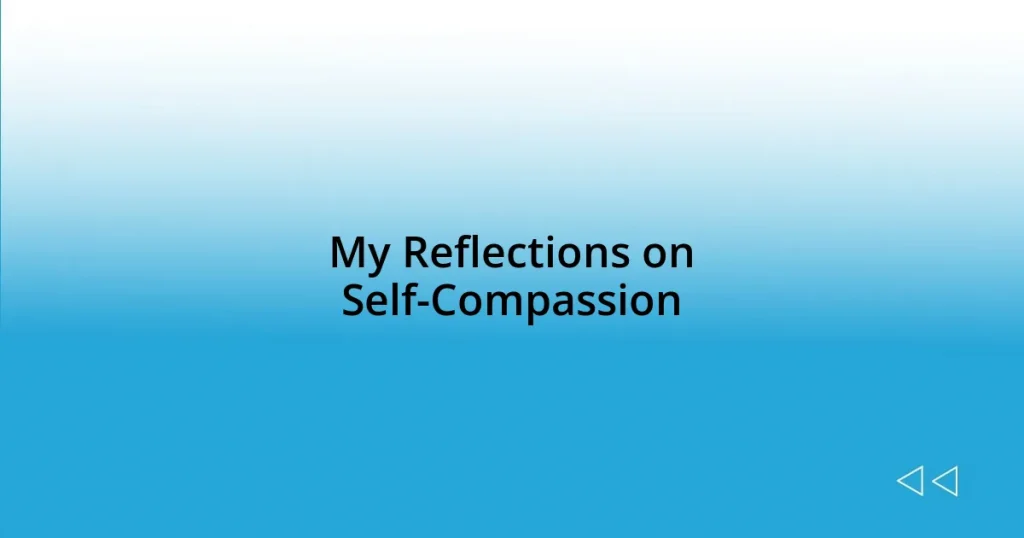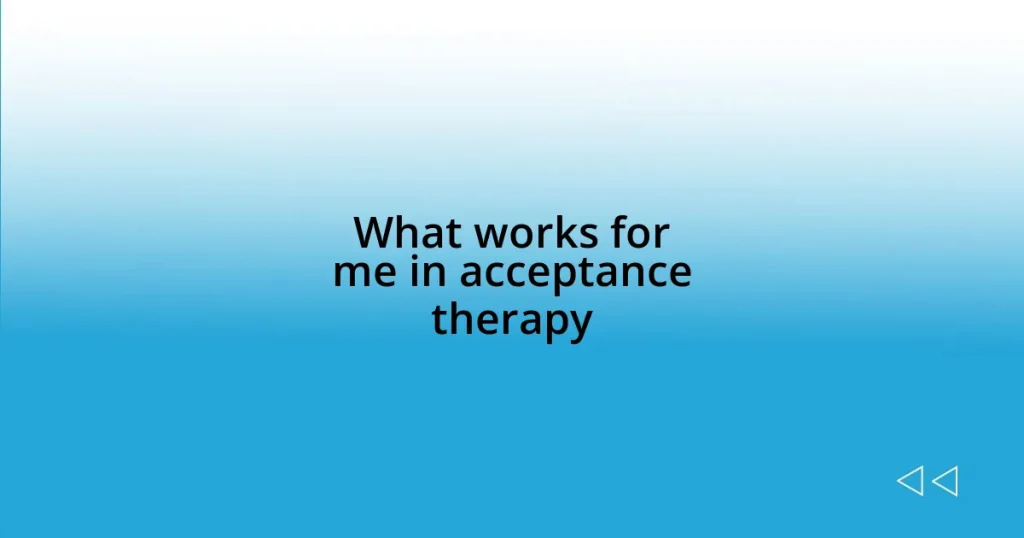Key takeaways:
- Self-compassion acts as a crucial buffer against self-criticism, promoting emotional resilience and personal growth.
- Key elements of self-compassion include self-kindness, recognition of common humanity, and mindfulness.
- Common misconceptions about self-compassion include viewing it as weakness or self-indulgence, while in reality, it enhances motivation and accountability.
- Practicing self-compassion improves overall well-being, reduces anxiety, and enriches relationships through better communication and empathy.
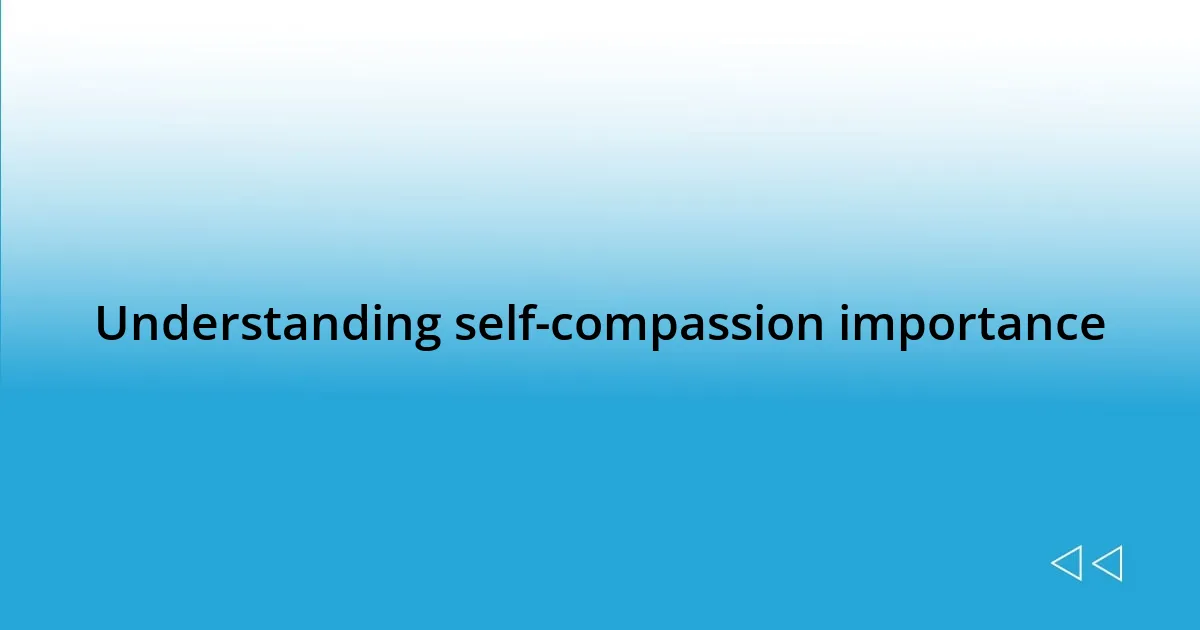
Understanding self-compassion importance
Self-compassion is crucial because it acts as a buffer against the harshness of self-criticism. I remember a time when I faced a major setback at work; instead of berating myself, I took a moment to reflect on what I needed. That pause allowed me to treat myself with kindness rather than judgment, which, in turn, fueled my growth rather than stifling it.
Have you ever noticed how we’re often our own worst critics? I’ve found that when I embrace self-compassion, I reduce my emotional distress significantly. Acknowledging that it’s okay to struggle helps me connect with my own humanity and fosters a sense of belonging, both to myself and to others.
Understanding the importance of self-compassion also encourages resilience. After all, when we speak to ourselves with kindness, we build a mental space that allows for learning instead of shame. Think about this: how would our lives change if we treated ourselves like our own best friends?
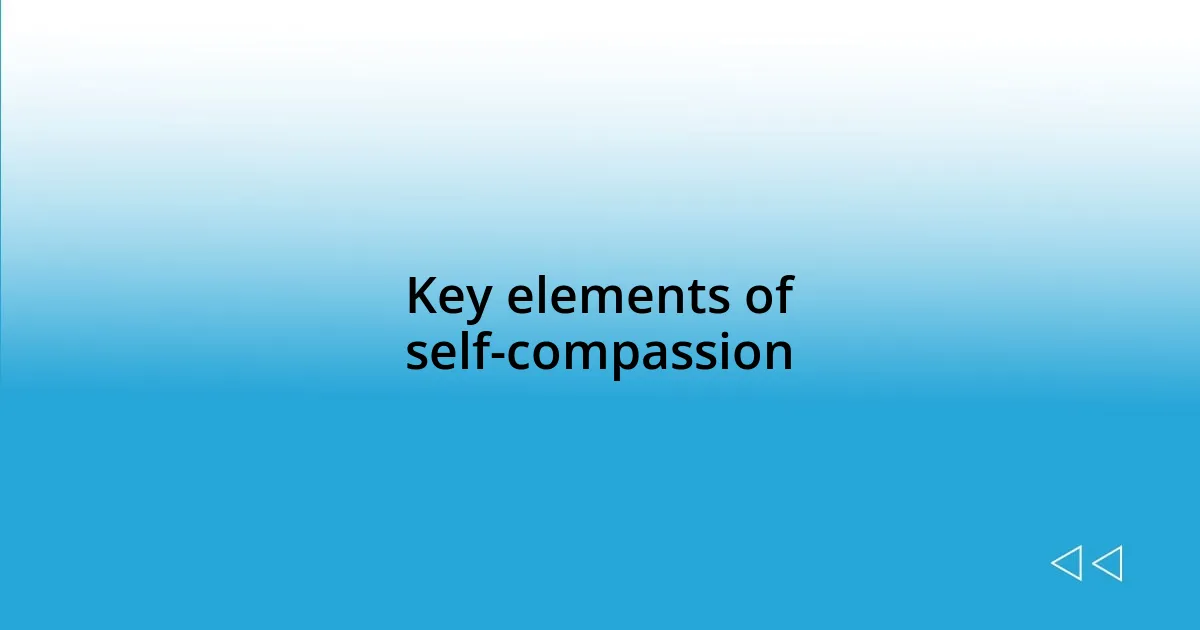
Key elements of self-compassion
One of the key elements of self-compassion is self-kindness. I vividly recall a moment when, after a tough workout, I felt defeated for not meeting my personal goals. Instead of calling myself lazy, I reminded myself that every effort counts, and it was okay to be a little off my game. This gentle approach allowed me to recover and refocus without the weight of negativity dragging me down.
Another critical aspect is the recognition of common humanity. In practicing this, I often find myself reflecting on how everyone experiences struggles. Here’s a quick breakdown of core elements:
- Self-Kindness: Treating yourself with care and understanding during tough times.
- Common Humanity: Realizing that suffering and feelings of inadequacy are universal experiences.
- Mindfulness: Maintaining a balanced awareness of one’s emotions without exaggeration or suppression.
By weaving these elements into my daily life, I’ve noticed a profound shift in how I approach challenges, turning potential self-doubt into opportunities for growth.
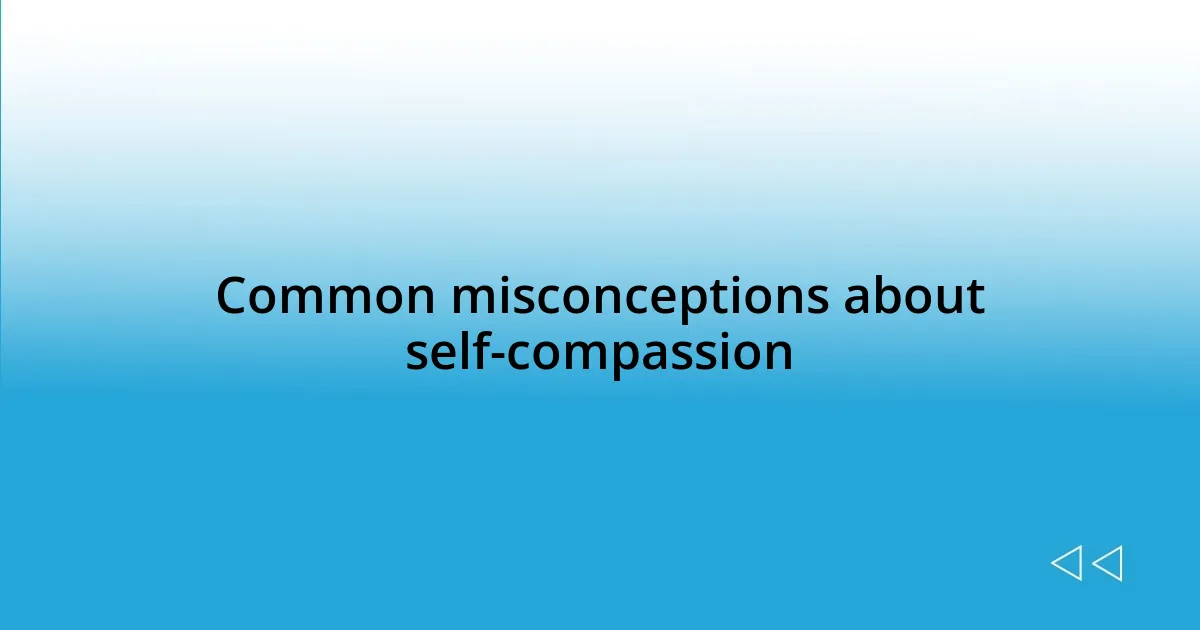
Common misconceptions about self-compassion
Self-compassion is often misunderstood as self-indulgence. I remember when a friend told me that being kind to oneself would just lead to laziness or complacency. However, the truth is that self-compassion enhances motivation and resilience. When we treat ourselves kindly, we create a safe space to grow rather than stagnate.
Another common misconception is that self-compassion means avoiding accountability. I’ve experienced moments when I felt that being compassionate would excuse my mistakes. In reality, self-compassion provides the courage to acknowledge our failings without spiraling into self-criticism. This balance allows for honest reflection while fostering personal growth.
Many people also think self-compassion is a sign of weakness. I once felt that admitting I was struggling would make me seem vulnerable. Yet, embracing self-compassion has shown me that acknowledging my struggles is a profound strength. It builds emotional resilience, allowing me to face challenges with a renewed sense of purpose and understanding.
| Misconception | Truth |
|---|---|
| Self-compassion is self-indulgence | It enhances motivation and resilience. |
| Self-compassion avoids accountability | It encourages honest reflection and growth. |
| Self-compassion is a sign of weakness | It demonstrates strength and builds resilience. |
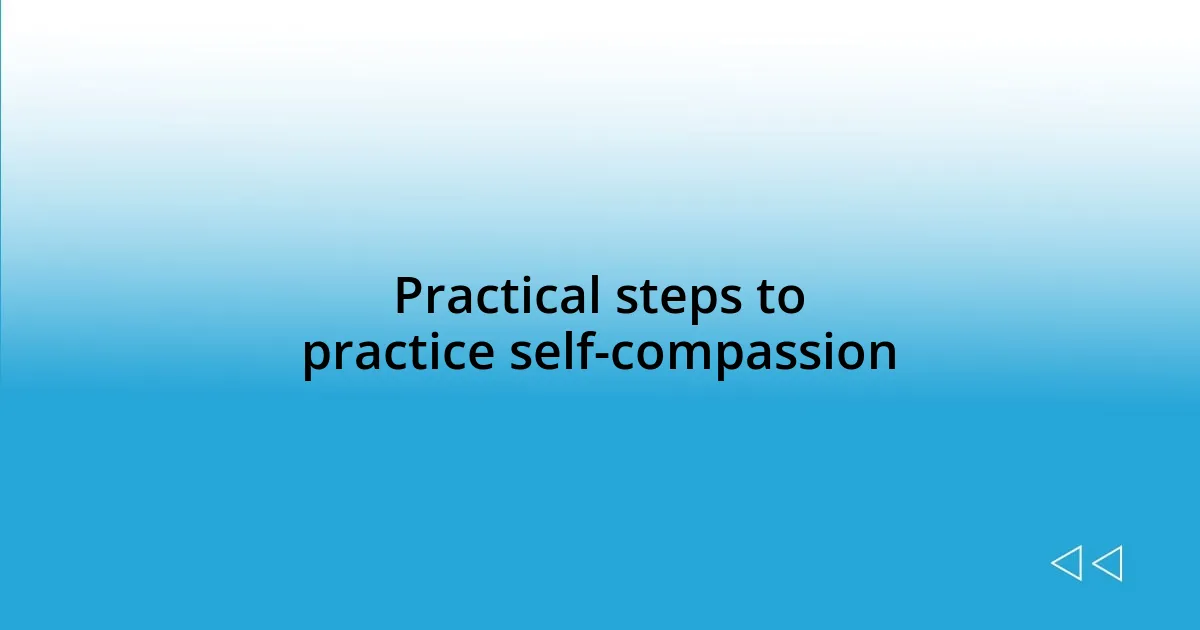
Practical steps to practice self-compassion
One practical step I often take to practice self-compassion is to write myself a letter during tough times. This may sound a bit silly at first, but pouring my thoughts onto paper, as if I were writing to a close friend, helps me see things more clearly. I remember a particularly challenging day at work when everything felt overwhelming; crafting that letter allowed me to step back, gain perspective, and treat myself with kindness rather than criticism.
Mindfulness is another powerful tool in my self-compassion toolkit. When I find myself spiraling into negative thoughts, I pause and breathe deeply, focusing on the present moment without judgment. Just last week, I caught myself ruminating about an embarrassing mistake I made in a meeting. By acknowledging my feelings without overreacting to them, I cultivated a sense of peace, reminding myself that everyone stumbles sometimes—it’s simply part of being human.
Finally, I encourage myself to celebrate little victories, no matter how small. I often ask, “What is something I did today that I can appreciate?” Recently, after a busy week, I acknowledged that I managed to stick to my exercise routine. Recognizing these moments isn’t about boasting but rather reinforcing a habit of self-kindness—because celebrating my efforts can inspire me to keep going on tougher days.
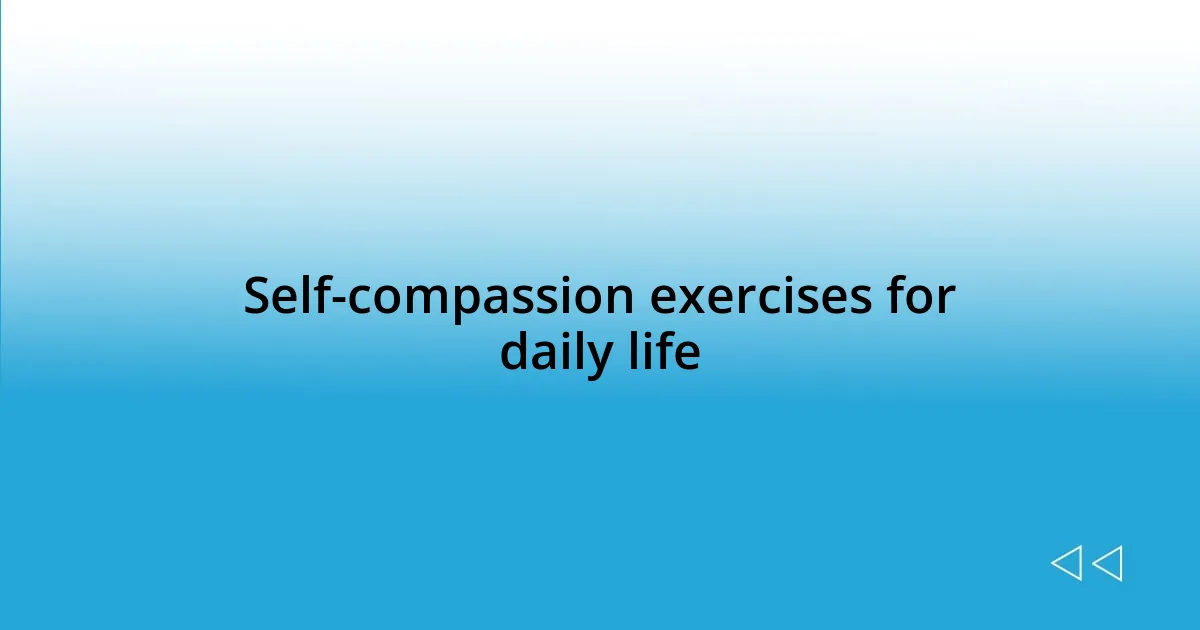
Self-compassion exercises for daily life
One exercise I find invaluable is the practice of self-check-ins throughout my day. I set aside just a few minutes to tune into my feelings. For instance, while sipping my morning coffee, I ask myself, “How am I feeling right now?” This simple act has a profound effect; it allows me to acknowledge my emotions without judgment, reminding me that it’s okay to feel whatever I’m feeling.
Another approach I’ve embraced is creating positive affirmations tailored to my day. When I wake up, I often repeat a phrase like, “I am doing my best, and that is enough.” A few months ago, on a particularly stressful morning, I found strength in this mantra. It served as a gentle reminder that self-compassion isn’t just a fleeting thought but a consistent practice that I can reinforce daily.
Moreover, I try to incorporate small acts of kindness toward myself, like taking a moment to enjoy a favorite song or indulging in a warm bath after a long day. Recently, while taking that bath, I reflected on the challenges I faced that week and allowed myself to feel grateful for my perseverance. Isn’t it fascinating how treating ourselves with this sort of kindness can shift our entire perspective? These exercises can transform our self-dialogue and make compassion an integral part of our daily lives.
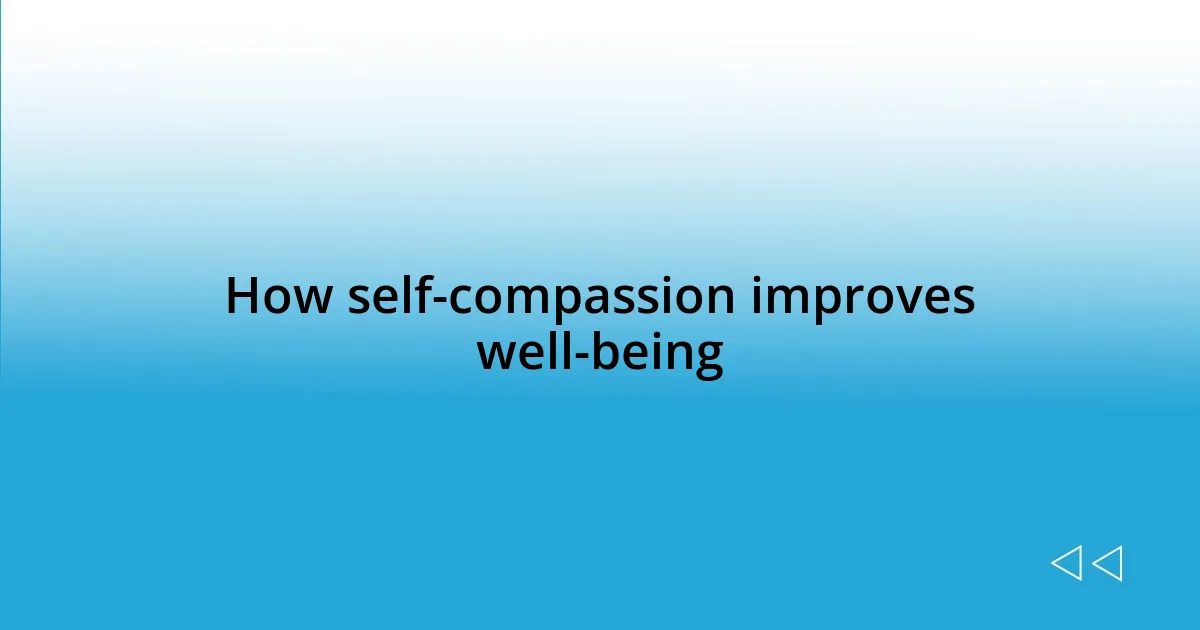
How self-compassion improves well-being
Self-compassion has a transformative effect on overall well-being, and I’ve experienced this firsthand. When I began practicing self-compassion, I noticed a remarkable reduction in my anxiety levels. Instead of beating myself up over mistakes, I learned to approach them with curiosity and understanding. Isn’t it liberating to realize that treating ourselves gently can actually lighten that emotional burden?
Another incredible benefit I’ve observed is the boost in my resilience. On a day when everything seemed to be going wrong, I paused and reminded myself, “It’s okay to feel this way.” By granting myself that permission, I became more adaptable. Remembering that hardships are part of the human experience made me more open to learning from my struggles rather than feeling defeated by them.
Self-compassion also enriches my relationships with others. I’ve found that when I am kinder to myself, I’m naturally more compassionate toward those around me. I recall an instance where a friend was going through a rough time. My newfound understanding allowed me to support her without judgment, just as I have learned to support myself. Isn’t it interesting how extending compassion outward often stems from our inner dialogue? It creates a ripple effect that not only enhances our lives but also the lives of those we care about.
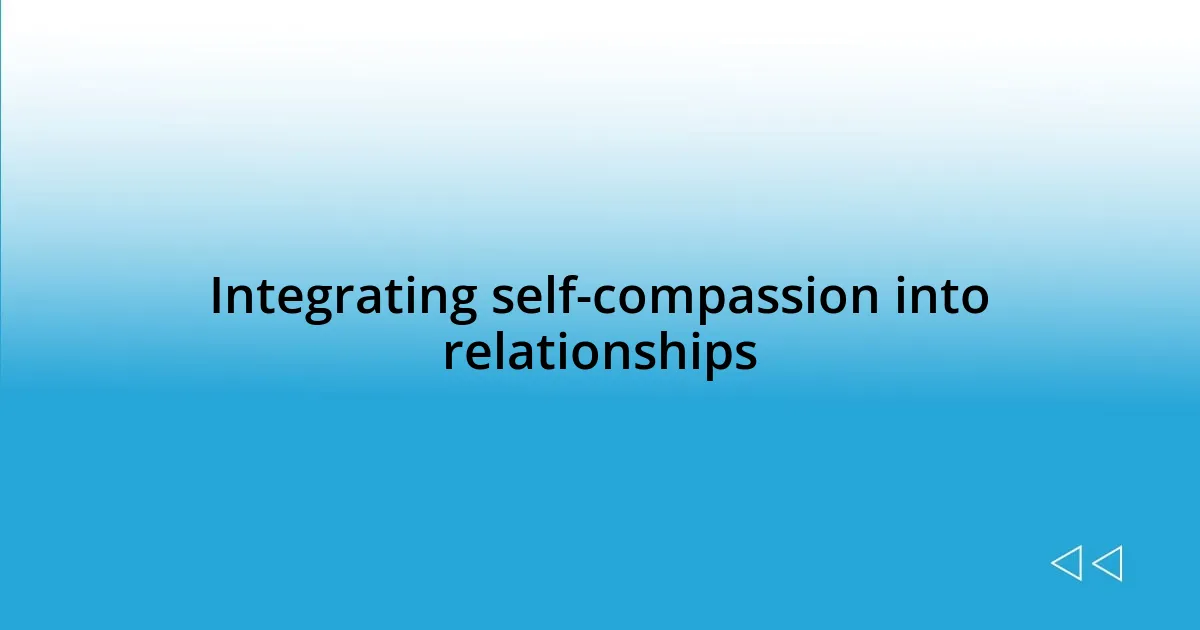
Integrating self-compassion into relationships
Integrating self-compassion into our relationships can feel revolutionary. I remember a time when I struggled to communicate my needs clearly. Instead of expressing myself, I often bottled up feelings, which led to misunderstandings with loved ones. When I started treating myself with more kindness, I noticed I became better at expressing my thoughts and emotions. Could it be that understanding my own feelings actually opened the door for more honest communication with others?
One day, a friend confided in me about their feelings of failure. Instead of jumping in with solutions, I found myself reflecting on how I would want someone to speak to me during tough times. I gently reassured my friend that they were enough just as they were, echoing the self-affirmations I often practiced. That day, I realized that extending compassion to others is an extension of the love and understanding I’ve learned to offer myself. Isn’t it amazing how those conversations can bloom when we hold space for ourselves first?
Moreover, I find that when I practice self-compassion, conflicts can be resolved with more ease. The other week, I had a disagreement with my partner, and instead of reacting defensively, I paused to check in with my own feelings of hurt. This quick moment of self-reflection allowed me to approach the situation with empathy rather than anger. Isn’t it remarkable how the energy we bring into a disagreement can shape its outcome? I’ve seen that when I face challenges with a kind heart, my relationships deepen and flourish.











